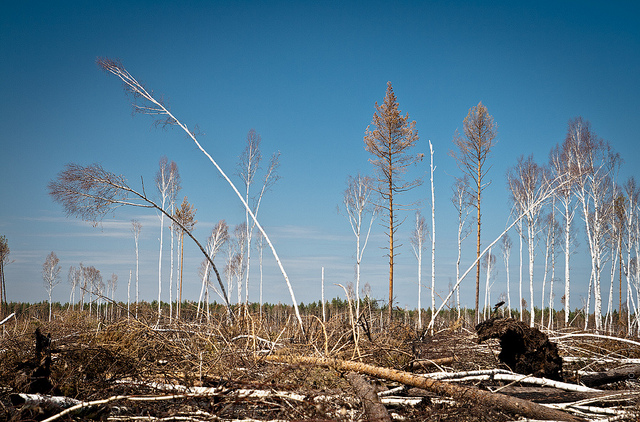
RUSSIA, NEAR RYAZAN - 8 MAY 2011: Piled up wood in the forest one winter after a terribly huge forest fire in Russia in year 2010. Image: Max Mayorov (Flickr).
There is a great deal of interest in the use of crowdsourcing tools and practices in emergency situations. Gregory Asmolov’s article Vertical Crowdsourcing in Russia: Balancing Governance of Crowds and State–Citizen Partnership in Emergency Situations (Policy and Internet 7,3) examines crowdsourcing of emergency response in Russia in the wake of the devastating forest fires of 2010. Interestingly, he argues that government involvement in these crowdsourcing efforts can actually be used to control and regulate volunteers from the top down—not just to “mobilise them”. My interest in the role of crowdsourcing tools and practices in emergency situations was triggered by my personal experience. In 2010 I was one of the co-founders of the Russian “Help Map” project, which facilitated volunteer-based response to wildfires in central Russia. When I was working on this project, I realised that a crowdsourcing platform can bring the participation of the citizen to a new level and transform sporadic initiatives by single citizens and groups into large-scale, relatively well coordinated operations. What was also important was that both the needs and the forms of participation required in order to address these needs be defined by the users themselves. To some extent the citizen-based response filled the gap left by the lack of a sufficient response from the traditional institutions.[1] This suggests that the role of ICTs in disaster response should be examined within the political context of the power relationship between members of the public who use digital tools and the traditional institutions. My experience in 2010 was the first time I was able to see that, while we would expect that in a case of natural disaster both the authorities and the citizens would be mostly concerned about the emergency, the actual situation might be different. Apparently the emergence of independent, citizen-based collective action in response to a disaster was considered as some type of threat by the institutional actors. First, it was a threat to…
